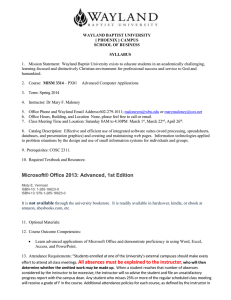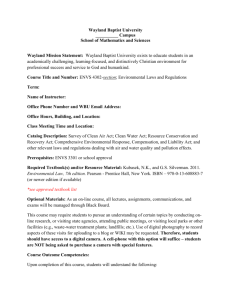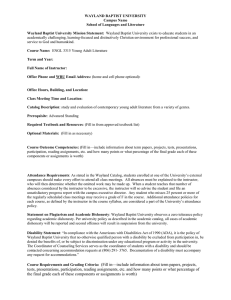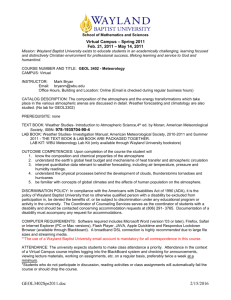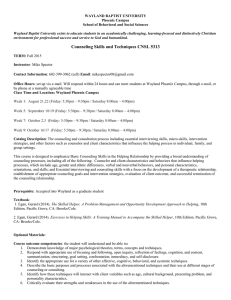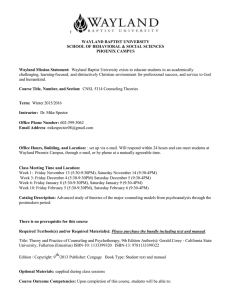COURSE SYLLABUS WAYLAND BAPTIST UNIVERSITY Fall 2014
advertisement
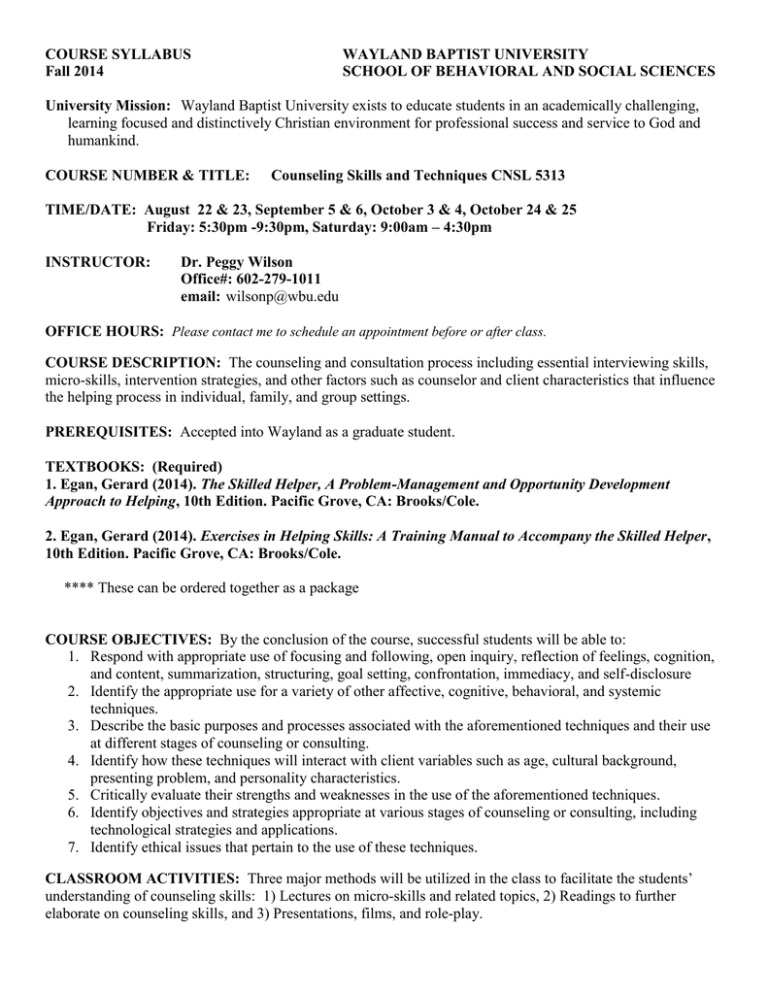
COURSE SYLLABUS Fall 2014 WAYLAND BAPTIST UNIVERSITY SCHOOL OF BEHAVIORAL AND SOCIAL SCIENCES University Mission: Wayland Baptist University exists to educate students in an academically challenging, learning focused and distinctively Christian environment for professional success and service to God and humankind. COURSE NUMBER & TITLE: Counseling Skills and Techniques CNSL 5313 TIME/DATE: August 22 & 23, September 5 & 6, October 3 & 4, October 24 & 25 Friday: 5:30pm -9:30pm, Saturday: 9:00am – 4:30pm INSTRUCTOR: Dr. Peggy Wilson Office#: 602-279-1011 email: wilsonp@wbu.edu OFFICE HOURS: Please contact me to schedule an appointment before or after class. COURSE DESCRIPTION: The counseling and consultation process including essential interviewing skills, micro-skills, intervention strategies, and other factors such as counselor and client characteristics that influence the helping process in individual, family, and group settings. PREREQUISITES: Accepted into Wayland as a graduate student. TEXTBOOKS: (Required) 1. Egan, Gerard (2014). The Skilled Helper, A Problem-Management and Opportunity Development Approach to Helping, 10th Edition. Pacific Grove, CA: Brooks/Cole. 2. Egan, Gerard (2014). Exercises in Helping Skills: A Training Manual to Accompany the Skilled Helper, 10th Edition. Pacific Grove, CA: Brooks/Cole. **** These can be ordered together as a package COURSE OBJECTIVES: By the conclusion of the course, successful students will be able to: 1. Respond with appropriate use of focusing and following, open inquiry, reflection of feelings, cognition, and content, summarization, structuring, goal setting, confrontation, immediacy, and self-disclosure 2. Identify the appropriate use for a variety of other affective, cognitive, behavioral, and systemic techniques. 3. Describe the basic purposes and processes associated with the aforementioned techniques and their use at different stages of counseling or consulting. 4. Identify how these techniques will interact with client variables such as age, cultural background, presenting problem, and personality characteristics. 5. Critically evaluate their strengths and weaknesses in the use of the aforementioned techniques. 6. Identify objectives and strategies appropriate at various stages of counseling or consulting, including technological strategies and applications. 7. Identify ethical issues that pertain to the use of these techniques. CLASSROOM ACTIVITIES: Three major methods will be utilized in the class to facilitate the students’ understanding of counseling skills: 1) Lectures on micro-skills and related topics, 2) Readings to further elaborate on counseling skills, and 3) Presentations, films, and role-play. COURSE EXPECTATIONS Attendance: Attendance is required. Late arrivals or early departures will have a negative impact on your learning and your grade. Material and information will be discussed in class that is not necessarily in the text. It is the students’ responsibility to obtain any material missed by not attending class for any reason, excused or unexcused. It is the student’s responsibility to inform the professor of the dates that they will be absent. The professor may assign homework for any unexcused absences. These extra assignments will be averaged in with the other homework assignments described below in determining final grade. TURN ALL CELL PHONES AND PAGERS OFF DURING CLASS. Readings: Assigned readings and/or chapters are to be completed prior to the class session for which they are assigned, so that students can participate in discussions, as well as ask and answer questions. ACADEMIC HONESTY: Wayland "expects students to be honest in all of their academic work. By enrolling, students agree to adhere to the highest standards of academic honesty and integrity and understand that failure to comply with this pledge may result in academic and disciplinary action." Plagiarism “Plagiarism — The attempt to represent the work of another, as it may relate to written or oral works, computerbased work, mode of creative expression (i.e. music, media or the visual arts), as the product of one's own thought, whether the other's work is published or unpublished, or simply the work of a fellow student. When a student submits oral or written work for credit that includes the words, ideas, or data of others, the source of that information must be acknowledged through complete, accurate, and specific references, and, if verbatim statements are included, through use of quotation marks as well. By placing one’s name on work submitted for credit, the student certifies the originality of all work not otherwise identified by appropriate acknowledgements. A student will avoid being charged with plagiarism if there is an acknowledgement of indebtedness. Examples include: 1. Quoting another person's actual words. 2. Using another person's idea, opinion, or theory, even if it is completely paraphrased in one's own words. 3. Drawing upon facts, statistics, or other illustrative materials — unless the information is common knowledge. 4. Submitting a paper purchased from a term paper service as one's own work. 5. Failing to accurately document information or wording obtained on the World Wide Web. 6. Submitting anyone else's paper as one's own work. 7. Violating federal copyright laws, including unauthorized duplication and/or distribution of copyrighted material. 8. Offering, giving, receiving or soliciting of any materials, items or services of value to gain academic advantages for yourself or another.” Source: http://www.spjc.cc.fl.us/webcentral/admit/honesty.htm#plag Disciplinary action for academic misconduct is the responsibility of the faculty members assigned to the course. The faculty member is charged with assessing the gravity of any case of academic dishonesty, and with giving sanctions to any student involved. Penalties may be applied to individual cases of academic dishonesty. See catalog for more information about academic dishonesty. Services for Students with a Disability: In compliance with the Americans with Disabilities Act of 1990 (ADA), it is the policy of Wayland Baptist University that no otherwise qualified person with disabilities be excluded from participation in, be denied the benefits of, or be subject to discrimination under any educational program or activity in the University. The Coordinator of Counseling Services serves as the coordinator of students with a disability and should be contacted concerning accommodation requests at (806) 291-3765. Documentation of a disability must accompany any request for accommodations. It is the responsibility of the student to inform the instructor, during the first week of class, if accommodation arrangements have been made with the coordinator of Counseling Services. Evaluation of student performance: Self-Reflection, Participation, Journaling/Workbook: (500 points) There will be multiple occasions during this course that you will be expected to reflect in writing, as well as participate in discussions on various issues and topics. Discussions may be in the form of class, small group or dyads. Please put serious thought into your honest responses to the issues/topics explored. Clinical documentation assignments: (100 points) During the course of the semester, the instructor will work with class on how to write up progress notes, treatment plans, and other essential forms of clinical documentation. You will then be given written assignments to demonstrate your ability to write up these clinical documents. More information will be provided by your instructor on these assignments. Video Reviews: (100 points) Student will watch videos during class and write up a review of your observations. More details will be provided in class by your instructor. Transcription Assignment: (100 points) Student will write a transcription of a session between a client and counselor. You will then use the Basic Counselor Response system to identify the microskill, the focus, and the rationale of each client-counselor dyadic interaction. More information will be provided by instructor in class. Midterm Exam: (100 points) Final Exam: (100 points) Point Conversion Table A = 900 -1000 points B = 800 - 899 points C = 700 - 799 points D = 600 - 699 points F = 599 points or below University Grading Scale: The University has a standard grading scale as follows: 90 - 100 = A (excellent); 80 - 89 = B (good); 70 - 79 = C (average); 60 - 69 = D (acceptable but below average); below 60 = F (unacceptable); W=the student withdrew from the course before the deadline; WP=the student withdrew passing before the deadline; WF=the student withdrew failing before the deadline (note that WF and F count the same in the GPA); and I=incomplete. A grade of “incomplete” is given only if circumstances beyond the student’s control prevented completion of work during the semester enrolled and any attendance requirements have been met. A grade of “incomplete” is changed if the deficiency is made up by midterm of the next regular semester; otherwise, it becomes an “F”. Professor reserves the right to modify syllabus as needed. Please consult catalog for important deadlines such as add/drop, withdrawal, etc. Course Outline (Tentative Schedule) Weekend #1 Aug 22/23 Intro to the course and overview of course expectations/Why do I want to be a counselor Part I: LAYING THE GROUNDWORK Ch1 Intro to Helping Ch2 The helping relationship: Values in action Ch3 Overview of the helping model Role-Play demonstrations Video and discussion Workbook assignments Weekend #2 Sept 5/6 Workbook assignments due Part II: STAGE I OF THE HELPING PROCESS AND THE SKILLS OF THERAPEUTIC DIALOGUE Ch4 Stage I: The Current Picture: Task 1—Partner with Clients to Help Them Tell Their Stories Ch5 Communication Skills of Therapeutic Dialogue: The Skills of Tuning in & Actively Listening to Clients Ch6 Empathic Responding: Working at Mutual Understanding Overview of how to complete the transcription assignment Work in dyads to practice skills Video-“Antwone Fisher” discussion Weekend #3 October 3/4 Video Reviews assignment due Workbook assignments due Midterm due Part II: STAGE I OF THE HELPING PROCESS AND THE SKILLS OF THERAPEUTIC DIALOGUE (continued) Ch7 The Art of Probing and Summarizing Ch8 Stage I: Task 2—Facilitate Client Self-Challenge: From New Perspectives to New Behavior Ch9 Stage I: Task 3—Partner with Clients in Their Search for Value Overview of how to write progress notes and treatment plans Part III: THE UNDERAPPRECIATED DIMENSIONS OF HELPING: HELP CLIENTS CRAFT AND CREATE A BETTER FUTURE Ch10 Introduction to Stages II and III: Decisions, Goals, Outcomes, and Impact Video and discussion In-class practice of microskills Weekend #4 October 24/25 Workbook assignments due Clinical Documentation assignment due Transcription assignment due Part III: THE UNDERAPPRECIATED DIMENSIONS OF HELPING: HELP CLIENTS CRAFT AND CREATE A BETTER FUTURE (continued) Ch11 Stage II: The Preferred Picture—Help Clients Design a Better Future and Commit Themselves to It Ch12 Stage III: The Way Forward—Help Clients Develop Plans to Accomplish Goals Ch13 The Action Arrow: Making It All Happen In class practice of microskills Video and discussion Final Exam (due November 1st by midnight)
